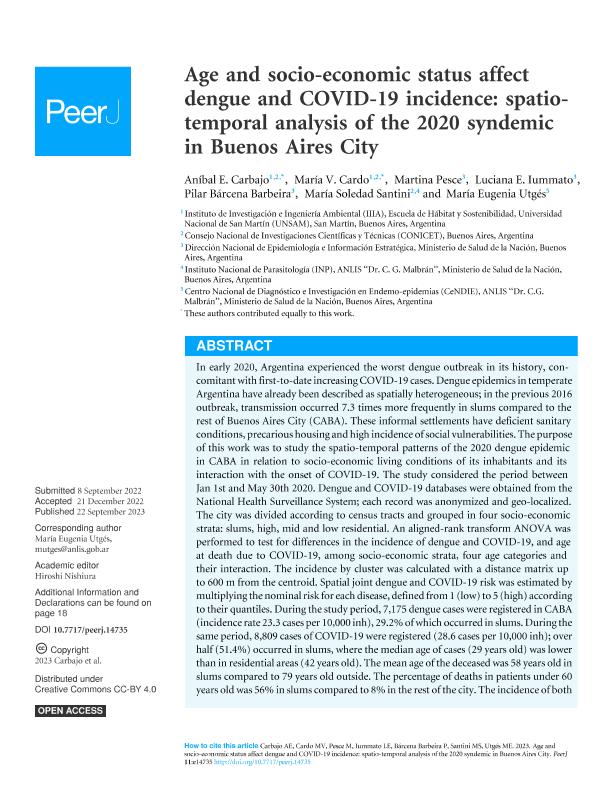Artículo
Age and socio-economic status affect dengue and COVID-19 incidence: Spatio-temporal analysis of the 2020 syndemic in Buenos Aires City
Carbajo, Anibal Eduardo ; Cardo, María Victoria
; Cardo, María Victoria ; Pesce, Martina; Iummato, Luciana E.; Bárcena Barbeira, Pilar; Santini, Maria Soledad
; Pesce, Martina; Iummato, Luciana E.; Bárcena Barbeira, Pilar; Santini, Maria Soledad ; Utgés, María Eugenia
; Utgés, María Eugenia
 ; Cardo, María Victoria
; Cardo, María Victoria ; Pesce, Martina; Iummato, Luciana E.; Bárcena Barbeira, Pilar; Santini, Maria Soledad
; Pesce, Martina; Iummato, Luciana E.; Bárcena Barbeira, Pilar; Santini, Maria Soledad ; Utgés, María Eugenia
; Utgés, María Eugenia
Fecha de publicación:
09/2023
Editorial:
PeerJ
Revista:
PeerJ
e-ISSN:
2167-8359
Idioma:
Inglés
Tipo de recurso:
Artículo publicado
Clasificación temática:
Resumen
In early 2020, Argentina experienced the worst dengue outbreak in its history, concomitant with first-to-date increasing COVID-19 cases. Dengue epidemics in temperate Argentina have already been described as spatially heterogeneous; in the previous 2016 outbreak, transmission occurred 7.3 times more frequently in slums compared to the rest of Buenos Aires City (CABA). These informal settlements have deficient sanitary conditions, precarious housing and high incidence of social vulnerabilities. The purpose of this work was to study the spatio-temporal patterns of the 2020 dengue epidemic in CABA in relation to socio-economic living conditions of its inhabitants and its interaction with the onset of COVID-19. The study considered the period between Jan 1st and May 30th 2020. Dengue and COVID-19 databases were obtained from the National Health Surveillance System; each record was anonymized and geo-localized. The city was divided according to census tracts and grouped in four socio-economic strata: slums, high, mid and low residential. An aligned-rank transform ANOVA was performed to test for differences in the incidence of dengue and COVID-19, and age at death due to COVID-19, among socio-economic strata, four age categories and their interaction. The incidence by cluster was calculated with a distance matrix up to 600 m from the centroid. Spatial joint dengue and COVID-19 risk was estimated by multiplying the nominal risk for each disease, defined from 1 (low) to 5 (high) according to their quantiles. During the study period, 7,175 dengue cases were registered in CABA (incidence rate 23.3 cases per 10,000 inh), 29.2% of which occurred in slums. During the same period, 8,809 cases of COVID-19 were registered (28.6 cases per 10,000 inh); over half (51.4%) occurred in slums, where the median age of cases (29 years old) was lower than in residential areas (42 years old). The mean age of the deceased was 58 years old in slums compared to 79 years old outside. The percentage of deaths in patients under 60 years old was 56% in slums compared to 8% in the rest of the city. The incidence of both diseases was higher in slums than in residential areas for most age categories. Spatial patterns were heterogeneous: dengue presented higher incidence values in the southern sector of the city and the west, and low values in highly urbanized quarters, whereas COVID-19 presented higher values in the east, south, high populated areas and slums. The lowest joint risk clusters were located mainly in high residential areas, whereas high joint risk was observed mainly in the south, some western clusters, the historical part of the city and center north. The social epidemiological perspective of dengue and COVID-19 differed, given that socio environmental heterogeneity influenced the burden of both viruses in a different manner. Despite the overwhelming effect of the COVID-19 pandemic, health care towards other diseases, especially in territories with pre-existing vulnerabilities, should not be unattended.
Palabras clave:
DENGUE
,
COVID-19
,
EPIDEMIOLOGY
,
SINDEMY
Archivos asociados
Licencia
Identificadores
Colecciones
Articulos (IIIA)
Articulos de INSTITUTO DE INVESTIGACION E INGENIERIA AMBIENTAL
Articulos de INSTITUTO DE INVESTIGACION E INGENIERIA AMBIENTAL
Articulos(SEDE CENTRAL)
Articulos de SEDE CENTRAL
Articulos de SEDE CENTRAL
Citación
Carbajo, Anibal Eduardo; Cardo, María Victoria; Pesce, Martina; Iummato, Luciana E.; Bárcena Barbeira, Pilar; et al.; Age and socio-economic status affect dengue and COVID-19 incidence: Spatio-temporal analysis of the 2020 syndemic in Buenos Aires City; PeerJ; PeerJ; 11; e14735; 9-2023; 1-23
Compartir



